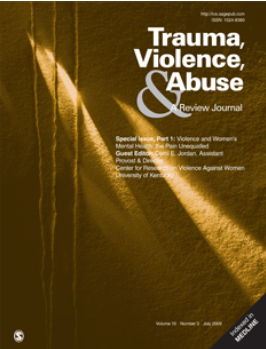Unpacking Parenting Intervention Content for Child Maltreatment: A Systematic Review Examining Core Components
IF 5.4
1区 社会学
Q1 CRIMINOLOGY & PENOLOGY
引用次数: 0
Abstract
This systematic review synthesized evidence from parental child maltreatment (CM) interventions by reviewing intervention evaluation studies on potentially effective intervention components and delivery techniques as well as identifying differences in the presence of these components based on maltreatment type. Quantitative intervention evaluations with an explicit parental CM outcome published in a peer-reviewed journal were considered for inclusion. This resulted in 60 final studies for the systematic review. The quality appraisal did not exclude any studies. Results were narratively synthesized using the Risk and Resilience Ecological framework and the behavior change techniques taxonomy with the help of systems mapping. Findings revealed the prevalence of intervention components among effective interventions, including parental emotional regulation (micro-individual level), managing child misbehavior (micro-family) and home visiting (mezzo). Prevalent behavior change techniques included “social support” and “instruction on how to perform a behavior” across all ecological levels. Physical abuse had the most maltreatment-type-specific intervention components (e.g., cognitive appraisal and parental motivation) and neglect only had one (management of parental risky health behaviors). No unique components targeting emotional and sexual abuse were identified. Findings highlighted potentially effective intervention components and the way they are delivered along with specific components aimed at types of maltreatment. Intervention provision can utilize these findings to tailor and develop effective provisions for parental CM. Researchers can shift attention to areas requiring more evidence such as the inclusion of a cultural perspective and evaluation of intervention provision for fathers, who are currently under-represented.拆解儿童虐待的父母干预内容:检视核心内容的系统回顾
本系统综述通过回顾对潜在有效干预成分和实施技术的干预评估研究,以及根据虐待类型确定这些成分存在的差异,综合了来自父母儿童虐待(CM)干预的证据。在同行评议的期刊上发表的具有明确父母CM结果的定量干预评估被考虑纳入。这导致了60项最终研究的系统评价。质量评价没有排除任何研究。在系统映射的帮助下,采用风险与弹性生态框架和行为变化技术分类法对结果进行了叙述性的综合。研究结果显示,有效的干预措施包括父母情绪调节(微观个体层面)、儿童不当行为管理(微观家庭层面)和家访(微观家庭层面)。流行的行为改变技术包括“社会支持”和“如何执行行为的指导”。身体虐待具有最多的虐待类型特定干预成分(例如,认知评价和父母动机),而忽视只有一个(父母危险健康行为的管理)。没有发现针对情感虐待和性虐待的独特成分。调查结果强调了可能有效的干预成分及其提供方式,以及针对虐待类型的具体成分。干预措施可以利用这些发现来定制和制定有效的父母CM措施。研究人员可以将注意力转移到需要更多证据的领域,例如纳入文化视角和评估为父亲提供的干预措施,目前父亲的代表性不足。
本文章由计算机程序翻译,如有差异,请以英文原文为准。
求助全文
约1分钟内获得全文
求助全文
来源期刊

Trauma Violence & Abuse
Multiple-
CiteScore
13.60
自引率
7.80%
发文量
131
期刊介绍:
Trauma, Violence, & Abuse is devoted to organizing, synthesizing, and expanding knowledge on all force of trauma, abuse, and violence. This peer-reviewed journal is practitioner oriented and will publish only reviews of research, conceptual or theoretical articles, and law review articles. Trauma, Violence, & Abuse is dedicated to professionals and advanced students in clinical training who work with any form of trauma, abuse, and violence. It is intended to compile knowledge that clearly affects practice, policy, and research.
 求助内容:
求助内容: 应助结果提醒方式:
应助结果提醒方式:


